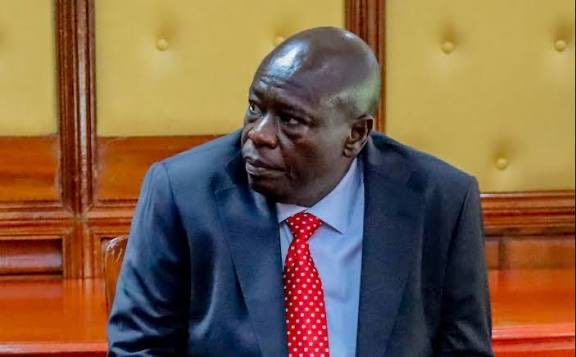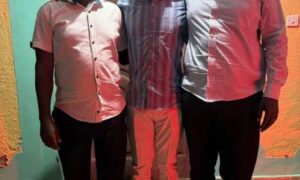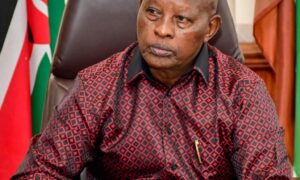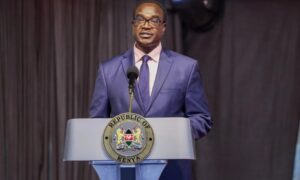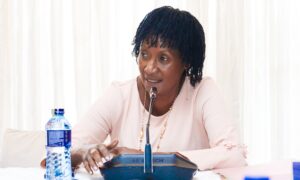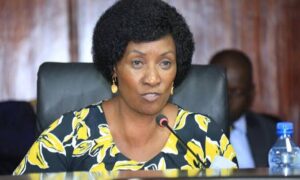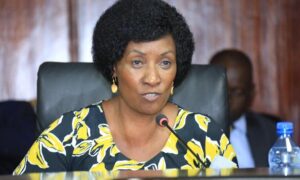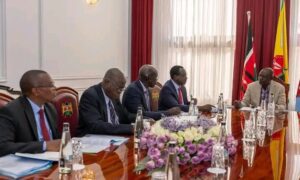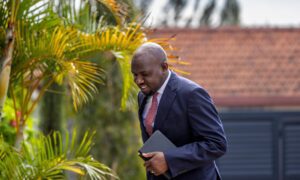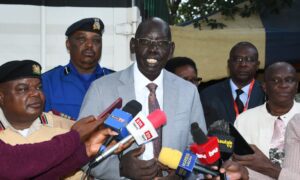A political storm is sweeping across Kenya following shocking claims that Homa Bay Governor Gladys Wanga has allegedly banned impeached Deputy President Rigathi Gachagua from stepping foot in Luo Nyanza. The move has ignited heated debate online and offline, sparking fears of tribal polarization, rising succession tensions within the Orange Democratic Movement (ODM), and deep emotional wounds following the death of former Prime Minister Raila Amolo Odinga.
The alleged ban comes at a time when the nation is still processing the abrupt passing of the iconic opposition leader. Raila, fondly known as “Baba,” leaves behind a towering political legacy and a loyal support base that is still mourning. Yet, even as Kenyans continue to pay tribute, political cracks are rapidly beginning to show.
MP Caleb Amisi Lashes Out at Luo Leaders
In a statement shared on X (formerly Twitter), Saboti MP Caleb Amisi expressed shock at what he described as aggressive politics emerging from Luo Nyanza right in the middle of a national mourning period.
His tirade was emotional, layered, and raw. He questioned why leaders appeared more invested in broad-based politics, ODM restructuring, and presidential succession rather than honoring Raila’s life and legacy.
“Why are they all over media spewing tribal animosity between a democratic community against other communities?” the MP asked. He further wondered why some leaders seemed motivated to eject ODM members such as Edwin Sifuna and Babu Owino, individuals Raila himself never cast aside.
Amisi’s rhetoric went further, expressing disbelief at how Raila’s health was handled and how quickly national attention has shifted. His interrogation of the events surrounding Raila’s passing has since fueled public speculation and conspiracy whispers online.
Kenyans React With Fear and Anger
Among Kenyans on social media, emotions are running high. One user wrote:
“Just imagining what’s going to happen, especially to Kikuyus living in Nyanza, given that Gachagua has been banned… Shame on you, Gladys Wanga.”
The comment triggered thousands of interactions, exposing underlying tensions among tribes, particularly Luo–Kikuyu relations, historically marked by political competition.
Many users expressed worry that innocent citizens could become targets of retaliatory hostility. Others scolded leaders for stoking unnecessary tribal fears.
Was the Ban Politically Motivated?
Gladys Wanga, a long-time Raila loyalist, has not publicly presented an official decree banning Gachagua. However, insiders whisper that political emotions are influencing public posturing. Some analysts argue that the alleged move is rooted in ongoing friction between:
✅ Pro–Raila loyalists
✅ Former Gachagua allies
✅ Individuals positioning themselves for ODM succession
If true, it would mark a dangerous escalation at Kenya’s most sensitive moment.
Mutahi Kahiga’s Controversial Remarks Add Fuel to the Fire
Tensions became worse after Nyeri Governor Dr. Mutahi Mutahi Kahiga appeared in a viral vernacular clip taken during a burial back home. Kahiga seemed to celebrate Raila’s death, suggesting that his absence would redirect development back to Mt. Kenya.
The comments triggered national outrage, forcing Kahiga to issue a formal apology on October 22, 2025. In his press statement, the governor apologized to:
- Mama Ida Odinga
- Rosemary, Junior, and Winnie Odinga
- Hon. Oburu Odinga
- MP Ruth Odinga
- The extended Odinga family
- Luo Nation
- ODM fraternity
- Kenyans at large
He insisted his remarks were personal views, not reflective of the Council of Governors. He then took responsibility for the “real and perceived meaning” of his comments and stepped down as Vice Chair of the Council of Governors.
Despite the apology, many Kenyans linked his remarks to a broader, coordinated agenda allegedly tied to Rigathi Gachagua’s political frustrations.
Is Luo Nyanza Turning Hostile Toward Outsiders?
Political analysts warn that public sentiment in Nyanza is currently delicate. The region views Raila as:
- A liberation hero
- A democratic icon
- The patriarch of local politics
With emotions raw, any perceived disrespect is being met with fierce resistance.
Some Luo leaders believe Gachagua’s political allies have spent years undermining Raila. Their resentment now appears to be resurfacing—more aggressively than ever.
ODM Succession Struggle Begins
Underneath everything lies a silent yet unstoppable truth:
👉 ODM is now facing its greatest leadership crisis in history.
Names circulating include:
- Hassan Joho
- Wycliffe Oparanya
- Babu Owino
- Edwin Sifuna
- Gladys Wanga
This power vacuum is stirring anxiety and suspicion, triggering internal wars disguised as public outrage.
Political experts fear a drawn-out battle that could fracture the party permanently.
Tribal Rhetoric: Kenya’s Old Scourge Returns
Kenya has a tragic history with tribal rhetoric. The fear-laden discussion around Kikuyus in Nyanza echoes painful memories from 2007–2008.
Today, social media magnifies every provocative comment, quickly turning online anger into offline hostility. Leaders are now under pressure to cool the temperature before emotions spiral out of control.
Unanswered Questions Loom Over Raila’s Death
Caleb Amisi asked questions many Kenyans are just beginning to whisper:
- Was Raila’s health properly managed?
- Why did his condition deteriorate so suddenly?
- Who benefits politically from his absence?
In the absence of transparent information, speculation is quickly replacing truth.
Time for Restraint
Kenya stands at a crossroads. Leaders from all sides must remember:
- Ordinary citizens pay the price for elite political wars.
- Tribal politics cost lives.
- Raila’s legacy was built on democracy, not division.
Conclusion
The alleged ban on Rigathi Gachagua, combined with Mutahi Kahiga’s controversial remarks, ODM succession battles, and online tribal animosity, indicates that Kenya is entering a volatile transition.
As the mourning period continues, Kenyans are demanding:
- Respect for Raila’s legacy
- National unity
- Responsible leadership
Anything less risks plunging the country into deeper political and social turmoil.
